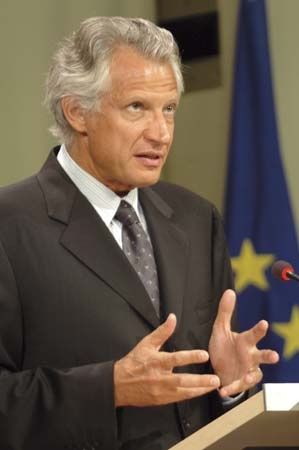de Villepin, Dominique
prime minister of France
in full Dominique-Marie-François-René Galouzeau de Villepin
born Nov. 14, 1953, Rabat, Mor.
 French diplomat, politician, and writer who served as interior minister (2004–05) and prime minister (2005–07) in the neo-Gaullist administration of Pres. Jacques Chirac (Chirac, Jacques).
French diplomat, politician, and writer who served as interior minister (2004–05) and prime minister (2005–07) in the neo-Gaullist administration of Pres. Jacques Chirac (Chirac, Jacques).De Villepin was born into an influential family; his father represented French industry abroad before securing a seat in the French Senate. The younger de Villepin eventually passed through France's elite École Nationale d'Administration and into the Foreign Ministry in 1980. His career there led to posts in Africa, Washington, D.C., and India, before he finally accepted an appointment as the top adviser to Foreign Minister Alain Juppé in 1993–95. After Chirac, de Villepin's political mentor, won the presidency in 1995, de Villepin became secretary-general of the Élysée Palace and played a key role in many decisions, including the premature dissolution of the National Assembly in 1997. The move, however, backfired when the conservatives lost rather than increased their majority.
Following the triumph of his conservatives in the June 2002 parliamentary election, Chirac chose de Villepin to run French foreign policy. As foreign minister, de Villepin faced difficulties with the United States over the possibility of war in Iraq (see Iraq War). De Villepin favoured diplomacy, and he insisted that United Nations (UN) inspections could lead to the peaceful disarmament of Iraq. Unilateral military action by the United States and the United Kingdom, he argued, lacked the legitimacy that only UN endorsement could confer. On Feb. 5, 2003, de Villepin made international headlines with a speech at the UN in which he denounced the U.S. case for war and won a highly unusual round of applause in the Security Council chamber.
In March 2004 de Villepin was appointed France's interior minister. He took a firm stand against illegal immigration and worked to counter the growth of radical Islamic fundamentalism by placing tighter restrictions on imams (imam) working in the country. He also required them to take courses in language, civics, and French customs. In May 2005 Jean-Pierre Raffarin resigned as prime minister, and de Villepin was named his successor. Shortly after taking office, however, he faced great unrest. In late October 2005, riots broke out in Paris suburbs and later spread throughout the country after two young men were accidentally electrocuted while fleeing police. The riots took place in largely immigrant neighbourhoods with high rates of unemployment and highlighted the racial tension that existed within the country. De Villepin subsequently announced that immigration controls would be tightened.
In 2006 de Villepin faced further turmoil after an unemployment law he supported led to mass protests and further riots. The law, which would have allowed employers to hire young workers (those 26 and younger) on a trial basis and deny them certain employment rights for a period of time, was vehemently opposed by youth activists and labour unions. De Villepin and Chirac eventually rescinded the law, and both found their political power significantly weakened. On May 15, 2007, de Villepin submitted his resignation to Chirac, who had decided not to seek a third term and who was later succeeded by Nicolas Sarkozy (Sarkozy, Nicolas).
De Villepin wrote a number of political articles, essays, and books, including Les Cent-Jours; ou, l'esprit de sacrifice (2001; “The Hundred Days; or, The Spirit of Sacrifice”), which centres on Napoleon (Napoleon I)'s return from exile on Elba. He also published a volume of politically motivated poems, Le Requin et la mouette (2004; The Shark and the Seagull), while foreign minister.
- Nordhausen
- Nordheim, Sondre
- Nordica, Lillian
- Nordic Council of Ministers
- Nordic skiing
- Nordmeyer, Sir Arnold Henry
- Nord-Norge
- Nord-Pas-de-Calais
- Nordraak, Rikard
- Nordström, Ludvig Anselm
- Nore, The
- Norfolk
- Norfolk and Western Railway Company
- Norfolk four-course system
- Norfolk Island
- Norfolk Island pine
- Norfolk, John Howard, 1st Duke of, Earl Marshal, Lord Howard
- Norfolk, Thomas Howard, 2nd Duke of, Earl Of Surrey, Earl Marshal
- Norfolk, Thomas Howard, 3rd duke of, earl of Surrey, Earl Marshal
- Norfolk, Thomas Howard, 4th Duke of, Earl Of Surrey, Earl Marshal
- Norfolk, Thomas Mowbray, 1st Duke of, Earl Of Nottingham, Earl Marshal
- Norfolk, Thomas of Brotherton, Earl of
- Norge, Géo
- noria
- Norian Stage